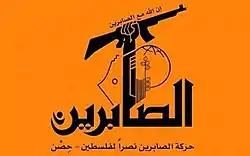Sabireen Movement
The Sabireen Movement (Arabic: حركة الصابرين نصراً لفلسطين - حِصن, Ḥarakah aṣ-Ṣābirīn Naṣran li-Filasṭīn - Ḥiṣn), meaning the "Movement of the Patient Ones", is a Palestinian militant group.
| Sabireen Movement | |
|---|---|
| Arabic: حركة الصابرين نصراً لفلسطين Ḥarakah aṣ-Ṣābirīn Naṣran li-Filasṭīn | |
 Flag used by the group | |
| Leaders | Hisham Salim Ahmed Shariff al-Sarhi |
| Dates of operation | 25 May 2014 – present |
| Headquarters | Shuja'iyya, Gaza Strip |
| Active regions | Palestinian Territories |
| Ideology | Anti-Zionism Islamism |
| Allies | |
| Opponents | |
| Battles and wars | Gaza–Israel conflict |
| Designated as a terrorist group by | |
| Website | alsabireen.ps |
History
In 2015, Hamas called for the dissolution of the group with Hamas claiming “Sabireen's involvement was against the people of Gaza”, Hamas has also interrogated individuals affiliated with the Sabireen Movement.[2]
In early 2018 the Trump administration designated the group as a Specially Designated Global Terrorist Organization under an executive order.[3][4] A Washington DC based think tank called The Washington Institute for Near East Policy asserted that the group's formation could be a bid by Iran to replace Hamas as a proxy with Sabireen given Hamas' stance on Syria and the religious divide between the two.[5]
In 2019, Hamas arrested 70 Sabireen members and confiscated their weapons, effectively ending the existence of the organisation. The reasoning behind such move was that Hamas wanted to maintain peace with Israel, while Sabireen Movement refused any attempts at reconciliations.[6]
Ideology
Upon creation, the movement did not introduced itself as a Shiite movement. Its secretary general says it does not represent a certain sect, stressing that sectarianism only serves the enemies' best interests. He also denies that the movement only consists of Shiites and does not accept Sunni members.[7]
In January 2016, Hisham Salim, founder of the Harakat al-Sabireen, told the Palestinian Ma'an News Agency that the group, like Hezbollah, is directly funded by the Iranian government, but stressed that his group was non-sectarian, non-religious and certainly not a "Shiite movement."[8]
References
- https://www.publicsafety.gc.ca/cnt/ntnl-scrt/cntr-trrrsm/lstd-ntts/crrnt-lstd-ntts-en.aspx#27
- "مصادر لـ24: حماس تحل وتحظر حركة "الصابرين" لمحاولة نشرها التشيع في غزة". 24.ae.
- "Trump administration designates Iranian-spawned jihadist faction in Gaza - FDD's Long War Journal". 1 February 2018.
- "What is Harakat al-Sabireen and why is Hamas trying to block their expansion? - Palestine - CRPME".
- Ehud Yaari (28 September 2015). "Replacing Hamas: Iran's New Proxy Militia in Gaza". The Washington Institute for Near East Policy. Retrieved 29 May 2020.
- https://www.al-monitor.com/pulse/originals/2019/03/gaza-hamas-bans-sabireen-movement-shiite-iran.html
- "Al-Sabireen: an Iran-Backed Palestinian Movement in the Style of Hezbollah". www.raseef22.com/e.
- "Iran-backed jihadi group claims it's operating in West Bank, Jerusalem". www.timesofisrael.com.